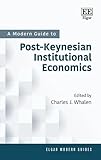A Modern Guide to Post-Keynesian Institutional Economics / edited by Charles J. Whalen
Material type: TextSeries: Elgar Modern GuidesPublication details: UK: Edward Elgar Publishing Limited, 2022.Description: xiii, 406p.; 23cmISBN:
TextSeries: Elgar Modern GuidesPublication details: UK: Edward Elgar Publishing Limited, 2022.Description: xiii, 406p.; 23cmISBN: - 9781035327430
- 330.156 WHA
| Item type | Current library | Call number | Status | Date due | Barcode | |
|---|---|---|---|---|---|---|
 Books
Books
|
Central Library | 330.156 WHA (Browse shelf(Opens below)) | Available | 000766 |
PART I INTRODUCTION
1 Introduction to the history, contours, and frontiers of
Post-Keynesian Institutional economics 2
Charles J. Whalen
PART II MONEY MANAGER CAPITALISM
2 The transition from managerial to money manager
capitalism: the role of risk and its distribution 36
David A. Zalewski
3 Financialization and employment: a Post-Keynesian
Institutionalist understanding of the transnational
corporation under money manager capitalism 59
Avraham I. Baranes
4 Money manager capitalism and the coronavirus pandemic 89
Yan Liang and Charles J. Whalen
5 Wealth inequality, household debt, and macroeconomic instability 121
Christian E. Weller and Emek Karakilic
6 Labor-market institutions matter: inequality, wage policy,
and worker well-being 144
Oren M. Levin-Waldman
PART III CONCEPTS AND METHODS
7 Social capital and public policy: the role of civil society in
transforming the state 173
Asimina Christoforou
8 Constructing an economically democratic society in the
former Soviet Union: Post-Keynesian Institutionalist
insights in historical perspective 194
Anna Klimina
9 A Post-Keynesian Institutionalist perspective from Latin
America: the monetary circuit across stages of development 216
Alicia Girón
10 What do economists really mean? Post-Keynesian
Institutionalists as economic translators 230
Timothy A. Wunder
11 Stock-flow consistent macroeconomic modeling and
Post-Keynesian Institutionalism 253
Marc Lavoie
PART IV THEORIES AND SYNTHESES
12 The market for labor in Post-Keynesian Institutionalism:
a theoretical framework 274
Eduardo Fernández-Huerga
13 The cyclical evolution of financial regulation: a theoretical
explanation 299
Samba Diop
14 From Public Choice to Minskyan collective action: the
case for macro rationality-based financial regulation 322
Faruk Ülgen
15 Women’s work and its conceptualization in
Post-Keynesian Institutionalism 339
Anna Zachorowska-Mazurkiewicz
16 Toward real sustainability: incorporating insight from
Ecological economics into Post-Keynesian Institutionalism 359
Charles J. Whalen
Index
This Modern Guide advances Post-Keynesian Institutional economics, an integrative tradition—inspired by keen economic observers such as John Kenneth Galbraith, Joan Robinson, and Hyman Minsky—that bridges Institutional and Post Keynesian economics. The tradition proved its worth by addressing the global financial crisis of 2007–2009, as well as by analyzing long-term trends accompanying the evolution of investor-driven (“money manager”) capitalism, including financialization, spreading worker insecurity, and rising inequality. The book begins with the history and contours of Post-Keynesian Institutionalism, and then breaks new ground, extending recent analyses of contemporary economic problems, sharpening concepts and methods, sketching new theories, and synthesizing ideas across research traditions. (Source: https://www.e-elgar.com/shop/gbp/a-modern-guide-to-post-keynesian-institutional-economics-9781035327430.html)
There are no comments on this title.

